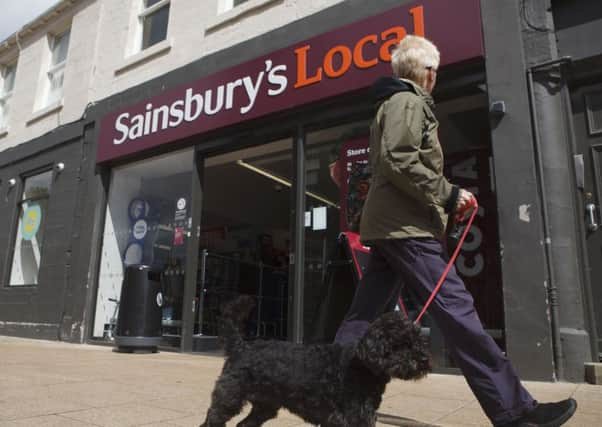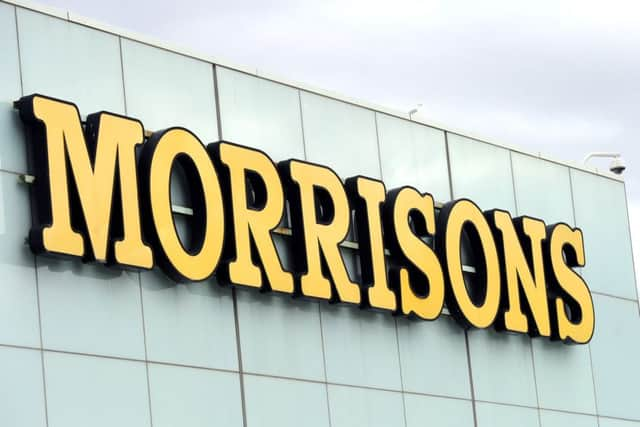Supermarket giants to test high street resilience
This article contains affiliate links. We may earn a small commission on items purchased through this article, but that does not affect our editorial judgement.


Evidence of that testing backdrop was made all too clear in Friday’s preliminary reading of first-quarter gross domestic product (GDP), with the UK economy enduring a worse-than-expected slowdown in the first three months of the year as sliding retail sales and a jump in living costs took their toll.
GDP grew by a slender 0.3 per cent, down sharply from the 0.7 per cent notched up in the fourth quarter of last year, and shy of most economists’ expectations.
Advertisement
Hide AdAdvertisement
Hide Ad• READ MORE: UK economy slowdown worse than feared as sales fall


Consumers have been feeling the pinch since the beginning of 2017, with inflation sitting at its joint highest level for more than three years at 2.3 per cent in March as the Brexit-buffeted pound drives up exports and raw ingredient costs.
The squeeze on household spending power has been compounded by dismal retail sales, which recorded their biggest fall for seven years in the three months to March.
Against that backdrop, two of the biggest names in UK retailing are poised to release figures this week that will be scrutinised for any fresh signs of pricing pressures.


Food sales will be in sharp focus when supermarket giant Sainsbury’s kicks things off with its full-year figures on Wednesday.
The “big four” chain revealed a 0.5 per cent fall in like-for-like supermarket sales, excluding fuel, in its fourth quarter to 11 March, down from a rise of 0.1 per cent in the previous three months.
While it said sales would have risen by 0.1 per cent had it not been for the later Mother’s Day and Easter this year, the group warned over “very competitive” trading and price pressures from the weak pound.
Advertisement
Hide AdAdvertisement
Hide AdOverall sales were boosted by a robust performance from its recently acquired Argos chain, which notched up a 4.3 per cent rise in like-for-like sales over the nine weeks.
The Argos sales hike helped lift group-wide comparable sales into positive territory, up 0.3 per cent in the fourth quarter.
Annual profits will include six months of trading from the Argos business, taken over alongside Habitat when the group acquired Home Retail for £1.4 billion last year. Analysts are pencilling in underlying annual pre-tax profits of about £578 million, including Argos, but experts at Jefferies said their forecasts point to a 15 per cent decline in earnings over the second half with Argos stripped out.
Sales at Sainsbury’s have lagged behind rivals in recent months, with the most recent Nielsen supermarket figures showing its share of the sector dipping 0.4 per cent to 15.4 per cent in the 12 weeks to 25 March.
There are also worries that the Argos acquisition leaves Sainsbury’s exposed to a possible consumer spending downturn sparked by the weak pound’s impact on prices. Analysts at Jefferies said: “Strong progress at Argos in recent months only partly moderates the cyclical risks attached to the acquired business.
“In reality, it is under-performance in food sales in the core supermarket chain that is more of a concern.”
Sainsbury’s recently opened its 50th Argos outlet within its stores and has committed to opening 250 Argos concessions over three years. It also plans to transform 60 stand-alone Argos stores to a digital format and bolster the number of mini-Habitat stores in its supermarkets from seven to 17.
Advertisement
Hide AdAdvertisement
Hide AdMeanwhile, arch-rival Morrisons is expected to report steady sales growth when it releases first-quarter results, despite facing industry pressures including rising food prices linked to the post-Brexit vote slide in sterling.
Like-for-like sales growth is expected to reach 1.7 per cent in the first quarter, according to Jefferies, while Shore Capital is forecasting an increase of between 1.75 per cent and 2 per cent over the period.
• READ MORE: Morrisons turnaround continues with surge in profits
Analysts say Morrisons is in a better position to handle a tougher trading environment than its peers, with retailers widely expected to suffer as shoppers reign in spending amid rising inflation. Food prices have already started to rise on supermarket shelves as producers pass on the soaring import costs triggered by the Brexit-hit pound.
“A number of industry sources have confirmed a step up in food prices in recent weeks,” Jefferies said in a research note led by equity analyst James Gzinic.
He pointed to the British Retail Consortium’s most recent survey, which showed that food inflation rose from minus 0.8 per cent in January to 1 per cent in March. In April, the Office for National Statistics reported a 1.4 per cent drop in retail sales over the three months to March, marking the biggest quarterly fall in seven years.